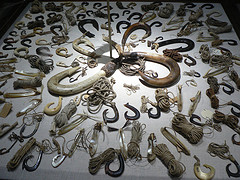That Dating vs. Hooking Up Study

A recent study on college students’ preferences for dating vs. hookups is, unaccountably, generating national media attention. The authors found that a bunch of 19-year-old college freshmen in the South embraced traditional gender norms. The study is called “To Hook Up or Date: Which Gender Benefits?” Notice the operative assumptions: That hooking up and dating are mutually exclusive; and that college intimacy is a zero-sum game that pits one gender against the other.
The paper opens with a startling claim, namely that “hooking up has replaced dating” on college campuses. The authors go on to say that college students now report more hookups than first dates. The authors define a hookup as an encounter between strangers or passing acquaintances with no expectation of commitment. The physical component can be anything from kissing to intercourse.
The authors acknowledge that theirs was a “sample of convenience. 221 subjects completed the 20-minute pencil and paper survey. They were all undergraduates, mostly freshmen, at James Madison University, a public school in Virginia. Their average age was 18.72 years. Women subjects outnumbered men by more than 2:1 (presumably because there were more female psych students in need of research participation credit).
If hookup culture killed dating, you wouldn’t know it from this sample. Nearly half the subjects said they were in a relationship: 29 had been dating for less than 6 months; 76 had been dating for at least 7 months, and 1 was engaged. Unfortunately, the study doesn’t break down relationship status by gender.
Students were asked whether they preferred traditional dating or hooking up in general. They were also asked about their preference for dating vs. hooking up in a variety of specific situations. For example, if they were drinking alcohol with an attractive person, would they prefer to go on a date with them or hook up with them? If they saw a potential for a long-term relationship with someone, would they prefer to date or hook up?
When they authors say “traditional dating,” they’re not kidding. The survey made it clear that students were being asked about the 1950s-style courtship. Traditional dating means the guy always asks, always pays, and always chooses where to go and what to do. On this model, the guy always makes the first sexual move. The researchers traditional model of dating paints women as passive. They have the right to refuse to date or decline a guy’s sexual advances.
46.67% of women and 45.07% of men said they preferred traditional dating to hooking up in general. 41.33% of women said they strongly preferred traditional dating compared to 19.72% of men. Overall 95.3% of women and 77.47% of men expressed some degree of preference for traditional dating over hookups. Men were more likely than women to prefer a casual hookup to a casual date. Interestingly, men and women were about equally likely to prefer a date to a hookup when they saw a potential for a long-term relationship with their hypothetical partner.
Amanda Marcotte finds the results unsurprising. All other things being equal, you’d expect women to prefer a traditional date to a hookup. On a traditional date, the guy pays for everything and takes all the risk of rejection. So, if you’re planning on sleeping with him anyway, wouldn’t it be nice if he magically intuited that and took you out for dinner first?
Let’s not forget the potential social desirability bias at play. According to the traditional narrative, women are supposed to like relationships and men are supposed to like anonymous sexual conquests. Psychologists know that people tend overstate preferences they believe to be socially desirable and understate preferences they think will make them look bad–even on anonymous questionnaires. Interestingly, despite some differences in stated preferences, men and women reported engaging equal numbers of first dates and hookups.
There’s a lot of faux concern among conservatives that sexual freedom hurts women by killing chivalry. Before we get misty eyed about how great traditional dating is for women, let’s remember the scenarios the women were asked to imagine: The guy they’re interested in will either take them out or hook up with them. That’s the upside. A real-life traditional dating system also involves a lot of sitting around, waiting for the guy you like to ask you out. The point is that the woman gets to choose the guy in the thought experiment. If that doesn’t happen in real-life, traditional dating doesn’t give the woman much recourse.
This study will no doubt be cited as proof of the “natural” or “innate” differences between men and women. It can just as easily be argued that this study is proof of the social constraints that men and women face. A culture of “traditional” dating and gender offers incentives for conformity and punishments for deviance. Women gain status by attracting male attention through acceptable channels (dating) and risk losing status if they are perceived promiscuous. The more entrenched the traditional dating culture, the more likely the group is to shame women who seek sex outside dating. The authors repeatedly stress that fear of rape has a lot to do with women’s reticence about hookups. The incentives are reversed for men: No strings attached sexual conquests are generally status-enhancing while having a girlfriend can be seen as an emasculating constraint.
College students are a convenient population for study, but I’m amazed that the hypothetical preferences of a bunch of 19-year-olds in a conservative part of the country are being discussed as proof of anything.




